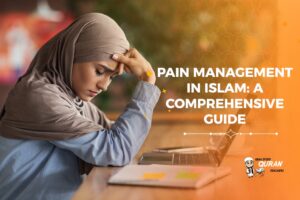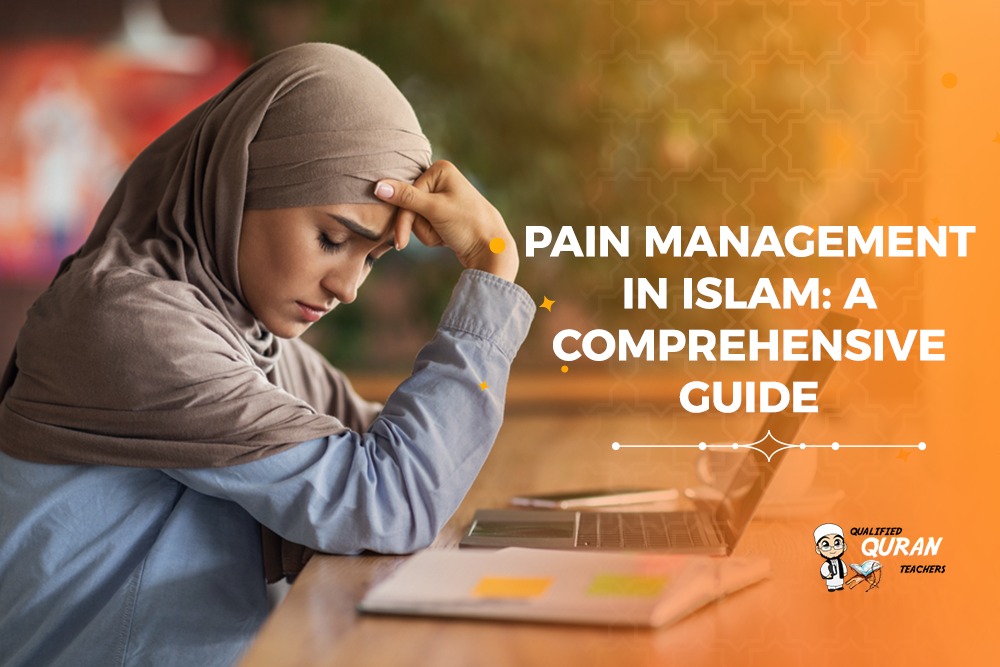Pain Management in Islam: A Comprehensive Guide
SEO Meta-description: Discover the holistic approach to Pain Management in Islam, combining spiritual, physical, and community-based practices to cope with pain effectively.
Pain, a universal human experience, is perceived and managed differently across cultures and religions. In Islam, pain management encompasses not only physical alleviation but also spiritual healing and community support. This article delves into the Islamic approach to pain management, offering insights into how faith, practice, and community can provide comprehensive relief and understanding.
Pain Management in Islam
Understanding Pain from an Islamic Perspective
In Islam, pain, whether physical or emotional, is considered a part of the human experience and a test from Allah (God). The Islamic approach does not view suffering as a purely negative phenomenon but as an opportunity for growth, self-reflection, and reconnection with one’s faith. The concept of Sabr (patience) is central to dealing with pain, where enduring discomfort with grace and faith is highly valued.
The Significance of Patience (Sabr) in Coping with Pain
Patience in Islam is not mere passive endurance but an active and hopeful resilience. It involves trusting Allah’s plan, maintaining a positive attitude, and continuing to perform good deeds despite suffering. This mindset is instrumental in managing pain, providing a spiritual framework that helps individuals navigate their suffering with dignity and purpose.

Islamic Teachings on Pain and Suffering
Quranic Verses on Pain and Endurance
The Quran offers numerous verses that comfort and guide Muslims through their hardships. These verses remind believers that Allah does not burden a soul beyond what it can bear and that with every hardship comes ease. Reflecting on these teachings can provide immense relief and perspective to those in pain.
Hadiths: Prophet Muhammad’s Guidance on Dealing with Pain
The Hadiths, sayings of Prophet Muhammad (PBUH), offer practical advice and spiritual solace for those suffering from pain. He taught his followers to seek Allah’s help with patience and prayer and provided specific supplications and practices for different types of pain, emphasizing the importance of seeking treatment and maintaining faith.
Spiritual Pain Management Techniques in Islam
The Role of Prayer (Salah) and Supplication (Dua) in Alleviating Pain
Prayer and supplication are fundamental in Islamic pain management. Engaging in regular Salah and making heartfelt Dua can bring spiritual comfort and physical relief. These practices help in recentering the mind, alleviating stress, and invoking Allah’s mercy and healing.
Fasting (Sawm) and Its Connection to Pain Endurance
Fasting, particularly during Ramadan, teaches self-discipline, empathy, and resilience. This act of worship can strengthen one’s spiritual fortitude, helping to manage pain with greater patience and understanding.
Physical Pain Management Methods in Islamic Tradition
Prophetic Medicine (Tibb an-Nabawi) for Pain Relief
Prophetic medicine refers to health guidance and practices found in the Hadith. Natural remedies, dietary adjustments, and holistic approaches recommended by Prophet Muhammad (PBUH) can be effective in managing various types of pain, complementing modern medical treatments.
Ablution (Wudu) and its Effects on Physical Well-being
The ritual of Wudu, beyond its spiritual significance, can have physiological benefits. The act of washing certain body parts can promote relaxation, reduce stress, and help in soothing minor pains, demonstrating the interconnectedness of spiritual practices and physical well-being in Islam.
The Concept of Reward (Aj reward) for Suffering in Silence
Islamic Views on Patience and Reward for Enduring Pain
In Islam, there is a great reward promised for those who endure pain and suffering with patience and faith. The concept of Aj (reward) for patience during hardship is a significant motivator for Muslims to manage pain gracefully, with the belief that their endurance will be rewarded in this life and the hereafter.
The Afterlife Perspective: Understanding Pain as a Test
The Islamic perspective on life and the afterlife provides a unique lens through which pain is viewed as a temporary test of one’s faith and character. This belief can drastically alter a believer’s response to pain, encouraging a more accepting and hopeful attitude.
Modern Pain Management Approaches and Islamic Ethics
Aligning Modern Pain Management Techniques with Islamic Principles
While Islam advocates for traditional and spiritual methods of pain management, it also supports the use of modern medicine and therapies, provided they do not contradict Islamic ethics. Integrating modern pain management techniques with Islamic practices can offer holistic relief and healing.
The Use of Medication and Surgery: An Islamic Perspective
The use of medication, surgery, and other modern medical interventions is permissible in Islam for pain relief, under the condition that they do not harm the body further and are used with the intention of healing. Islam encourages seeking cures and alleviates suffering while maintaining moral and ethical boundaries.
Community Support in Pain Management
The Importance of Ummah (Community) in Supporting the Afflicted
In Islam, the concept of Ummah, or community, plays a crucial role in supporting individuals dealing with pain. Community members are encouraged to assist the sick, offer emotional support, and provide practical help, reflecting the communal spirit and compassion at the heart of Islamic teachings.
Charitable Acts (Sadaqah) and Their Impact on Pain Relief
Engaging in charitable acts not only benefits those in need but can also have a healing effect on the giver. The act of giving Sadaqah can alleviate one’s own pain and suffering by instilling a sense of purpose, connection, and spiritual fulfillment.
Psychological Aspects of Pain in Islam
Coping Mechanisms for Mental and Emotional Pain
Islam offers various coping mechanisms for dealing with mental and emotional pain, including mindfulness in prayer, recitation of the Quran, and community engagement. These practices can help in mitigating anxiety, depression, and other psychological pains.
Islamic Counseling and Therapy: Combining Faith and Psychology
Islamic counseling integrates spiritual principles with psychological techniques to address the root causes of pain. This approach can be particularly effective for Muslims, as it respects their beliefs and cultural context, providing a comforting and familiar framework for healing.
Case Studies: Islamic Approaches to Pain Management
Real-life Examples of Individuals Managing Pain Using Islamic Principles
This section will include narratives and testimonies from individuals who have successfully integrated Islamic practices into their pain management strategies, showcasing the practical application and benefits of faith-based approaches.
Scholarly Interpretations and Medical Insights
Insights from Islamic scholars and medical professionals can shed light on the effectiveness and nuances of Islamic pain management, offering a well-rounded perspective on the subject.
Conclusion: Integrating Islamic Practices into Everyday Pain Management
In conclusion, pain management in Islam is a multifaceted approach that encompasses spiritual, physical, and community-based practices. By embracing these principles, Muslims can find relief, strength, and solace in their faith, making their journey through pain a meaningful and bearable experience.
FAQs
- What does Islam say about dealing with pain?
- How can prayer and supplication help in pain management according to Islamic teachings?
- Are there any specific Islamic practices recommended for physical pain relief?
- How does fasting impact one’s ability to manage pain?
- What role does the community play in helping individuals cope with pain in Islam?
- Can modern pain management techniques be incorporated into Islamic practices?
Understanding Pain Through Islamic Wisdom
In Islam, pain is not merely an affliction but a sign and a test from Allah. Muslims are taught to understand pain beyond its physicality; it is viewed as a means to erase sins, a test of faith, and a chance to gain rewards by patiently enduring it. This belief deeply influences the Islamic approach to pain management, making the experience deeply intertwined with spiritual growth and existential reflection.
The Role of Zakat and Alms in Alleviating Suffering
Zakat (mandatory charity) and voluntary alms (Sadaqah) are crucial components of Islam that extend beyond spiritual acts to encompass social welfare and pain alleviation. By providing support to those in need, the giver not only purifies their wealth but also contributes to the communal effort of easing pain and suffering. This system ensures that the Muslim community acts as a support network, where the pain and needs of the less fortunate are addressed collectively.
Endurance Through Hope and Trust in Allah
Hope (Raja) and trust (Tawakkul) in Allah are central to enduring pain in Islam. Muslims are encouraged to remain hopeful for relief and maintain strong faith in Allah’s wisdom and mercy. This optimistic outlook is fundamental in managing emotional and physical pain, as it provides a comforting assurance that all hardships are temporary and serve a greater purpose.
The Significance of Gratitude in Pain Management
Gratitude (Shukr) plays a significant role in the Islamic approach to handling pain. By focusing on blessings and maintaining a thankful disposition, Muslims can cultivate a positive mindset that helps mitigate the perception of pain. This attitude of gratitude not only eases mental anguish but can also lead to a more patient and perseverant approach to physical suffering.
Integrating Traditional Islamic Practices with Modern Therapies
While traditional Islamic practices provide a solid foundation for pain management, integrating these with modern medical treatments and therapies can offer comprehensive care. This integration respects religious beliefs while utilizing contemporary scientific advancements for effective pain relief and management.
The Impact of Community Prayer and Collective Supplication
In Islam, communal prayers and collective supplications are powerful tools for alleviating pain and suffering. The sense of unity, solidarity, and shared faith during group prayers can provide immense psychological comfort and support, reinforcing the individual’s resilience and capacity to manage pain.
Islamic Meditation and Mindfulness Techniques
Islamic meditation practices, such as Dhikr (remembrance of Allah), contemplation (Tafakkur), and reflection (Tadabbur), can be highly effective in managing pain. These practices encourage mindfulness, help reduce stress and anxiety, and promote a peaceful state of mind, which can alleviate the perception of pain.
Ethical Considerations in Pain Management
Islam places great emphasis on ethics and morality, which extends to the treatment of pain. This includes ensuring access to pain relief for all individuals, respecting patient autonomy, and avoiding harm. Ethical medical practices, combined with compassion and empathy, form the cornerstone of pain management in an Islamic context.
Navigating Emotional Pain and Spiritual Healing
Emotional and spiritual pain, such as grief, loss, and existential distress, are addressed within Islam through a comprehensive spiritual framework. This includes seeking solace in prayer, understanding divine wisdom, and connecting with a supportive community. The holistic approach encourages healing that encompasses both the heart and the mind.
Conclusion: A Holistic Approach to Pain Management in Islam
In conclusion, pain management in Islam is a multidimensional process that encompasses spiritual, physical, psychological, and communal aspects. By embracing this holistic approach, Muslims can find meaningful ways to cope with pain, drawing strength from their faith, community, and the profound teachings of Islam. The journey through pain, viewed through the lens of Islamic teachings, becomes not only bearable but also an opportunity for spiritual growth and personal development.
FAQs
- How does Islam help in coping with chronic pain?
- Can Islamic practices reduce the need for pain medication?
- What does Islam say about pain and suffering?
- How can non-Muslims benefit from Islamic approaches to pain management?
- Is it permissible in Islam to refuse pain treatment?
- How can I integrate Islamic principles into my pain management plan?

